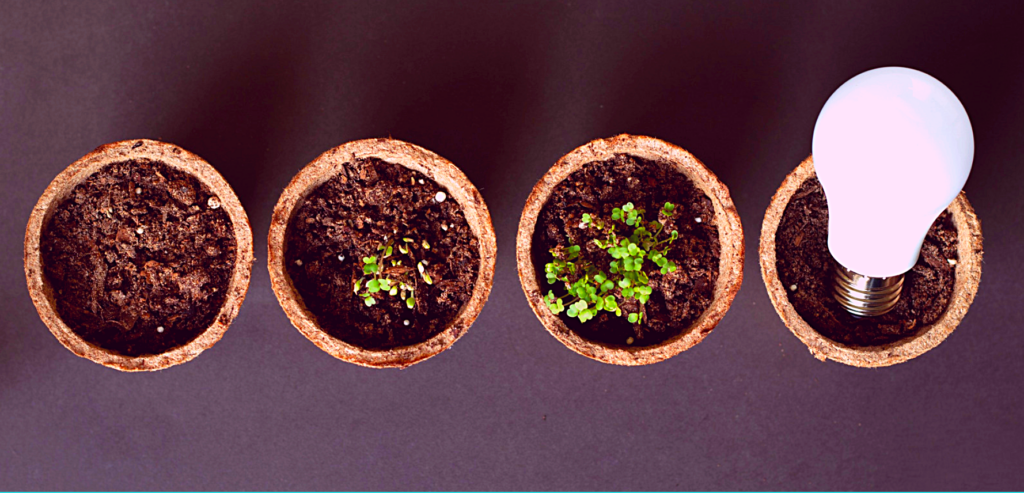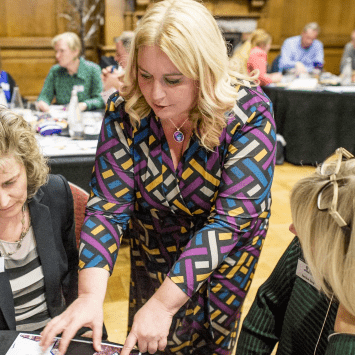Posted in Blog, Boost Your Brainpower, Create, Grow, Innovation by Jo North
Most of us think that to be more creative we need loud brainstorms and flashy new ideas. What if we’re wrong?
After 30 years in industry, a PhD, and many years as a business leader, what I’ve found about innovation and how to be more creative goes against the received wisdom.
Picture this: your business is facing a crisis. You need to come up with a new solution, fast. Do you take the time to be more creative, to reflect on new ideas, or do you jump in and do the first thing you can to get rid of the problem?
If we’re being honest, there’s a lot of BS in business. We often look for immediate solutions without digging deeper to develop a stronger approach.
It’s my perception that we reward the “just get it done” culture. We reward decisiveness and fast action above all else.
That act-fast-think-last approach isn’t working.
Things are changing. The climate is under threat. Covid-19 is not going away anytime soon. If innovation was once in the background, it’s come to the forefront. In everything from breaking down microplastics to developing new vaccines, innovation is the only way to solve our global problems.
Getting things done and being more creative
It’s not wrong to get on with things. When you’re facing a crisis, you can’t afford to waste time, and putting plans into rapid action is an essential part of what I do with innovation teams.
But sometimes just doing the most immediate thing means you’re missing out on a lot of better solutions.
If we go straight from problem to plan, we’re missing the creative step in between that can lead to vastly better outcomes.
Innovation is closely linked to creativity. They are two sides of the same prism, seen from a different angle.

Creativity opens up new ideas, new ways of doing things. Innovation lets you translate those ideas into working solutions.
Innovative solutions start with a creative process that harnesses your brain’s ability to make deep, surprising connections. So, the creative step is essential, whether you’re accomplishing your everyday work or facing the crisis of a lifetime.
But where does that creative step begin?
When we think of innovation, we tend to think of flashy new technologies, loud brainstorms, and confident, brash entrepreneurs.
Your Thought Garden
I teach and lead innovation teams at some of the top organisations in the UK. Most recently, I’ve been managing massive climate-friendly innovations for the Port of Tyne, where my work constantly puts me on the spot to facilitate and act on new ideas.
After 30 years in industry, a PhD, and many years as a business leader, what I’ve found about innovation and creativity goes against the received wisdom.
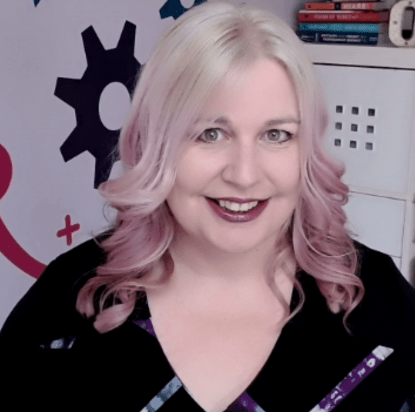
Contrary to what many of us believe, the best ideas don’t always come from the smartest thinkers or the loudest people in the brainstorm.
Instead, they come from a place of connection to ourselves and others. A place of receptiveness, openness, and growth.
I call this place your thought garden.
Grow Your Very Best Ideas
Albert Einstein is one of my favourite sources of inspiration. He’s the one who told us that we can’t solve problems by using the same kind of thinking we used when we created them.
You might be picturing Einstein as he’s often portrayed in movies — scribbling on a blackboard, wild curly hair flying around his head. But in fact, he came up with many of his world-changing ideas when he was sitting alone at his desk in a quiet room in the Swiss Patent Office.
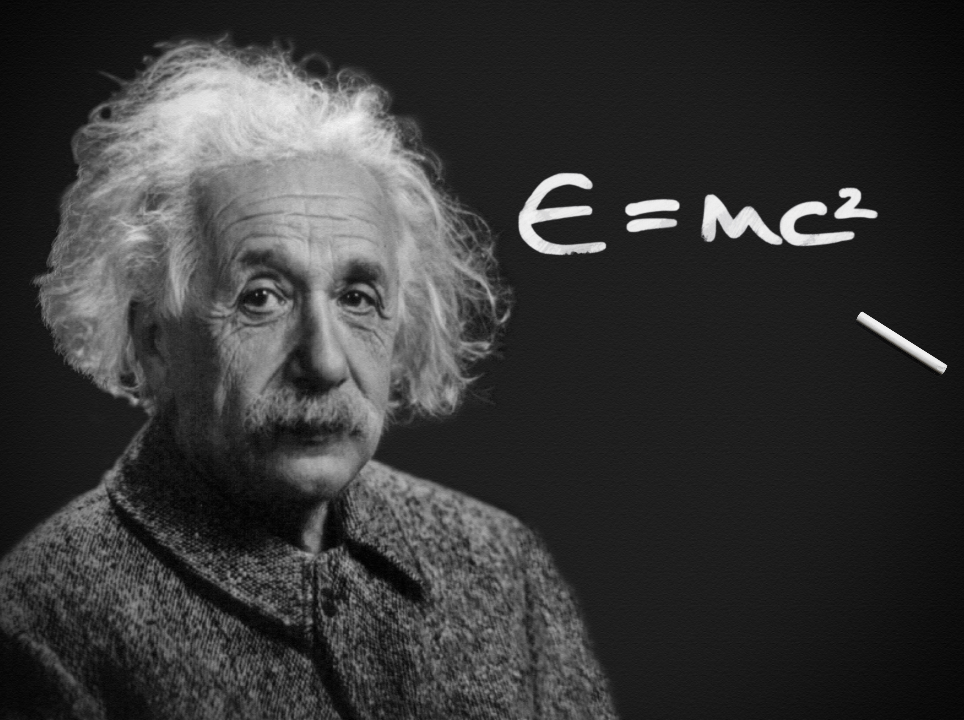
At this point in his life, Einstein had been unable to get a job as a physics professor. So, in 1902, he took the first steady job he could find, reviewing other people’s inventions, checking them for originality and working on patents to protect their ideas.
He didn’t give up on his work, though. When he finished his tasks for the day, he would sit and think, enjoying a place of quiet contemplation.
Einstein called the office “that worldly cloister where I hatched my most beautiful ideas.” Whilst working there, he published four major papers that changed the world of science as we know it.
These papers tackled some of the most important questions about how the universe works. They rewrote the rulebook for physics. The world wouldn’t be as we know it today if it weren’t for the groundbreaking ideas Einstein came up with in his spare time at the patent office.
Now I’m going to say something that may seem controversial. Einstein is known for being a genius, but there are plenty of clever people who haven’t made the same impact as him.
Create the Conditions for Your Creativity to Flourish
What allowed Einstein to change the world wasn’t just his knowledge and talents. It was valuing his ideas and finding the right conditions for his creativity to flourish.
Have you ever had a new idea, only to find yourself thinking, “Sure, I’ll have a look at that when I’m not too busy”? Or “I’d love to give it a go, but I don’t have the money or the confidence to try”?
Then there’s the line we trot out to murder all sorts of good ideas: “it won’t come to anything anyway!”
Very few people say they are ideas people. But actually, most of us are really good at coming up with new ideas. The problem is we don’t give them what they need to flourish.

To understand how to be more creative, you have to understand what creativity is.
Creativity comes from Connections
Creativity comes from connections. It’s your brain putting together ideas, memories, bits and pieces of what you have experienced throughout your lifetime.
Our minds are full of data points of everything we’ve seen, read, tasted, smelt, touched, felt, or imagined.
When two thoughts come together for the first time, there’s an electrical, chemical, and physical reaction that goes on between the neurons in our brains.
New ideas come from our minds sparking, connecting, building on what others have done before us.
It’s not a fully conscious process. A lot of the work of creativity goes on in the background, when we’re resting or going about our daily business, not intentionally thinking about the problem.
That’s why brilliant new ideas are known for popping up while you’re taking a shower or when you wake up in the middle of the night.

Your Mind is a Garden
Imagine that your mind is a garden. In that garden, you plant seeds of knowledge and ideas. Things that you see, hear, or experience throughout the day.
Little seeds of what you learn start to take root. What you do to feed your creativity is like the rain and sunshine that the garden needs to grow.
Ideas nourish other ideas, forming connections everywhere. They may sprout and suddenly blossom when you least expect it.
You don’t have to force them to grow, and in fact you can’t. The process just happens.
One day, as you look around the garden, you find a gorgeous new idea you didn’t even know was growing there.
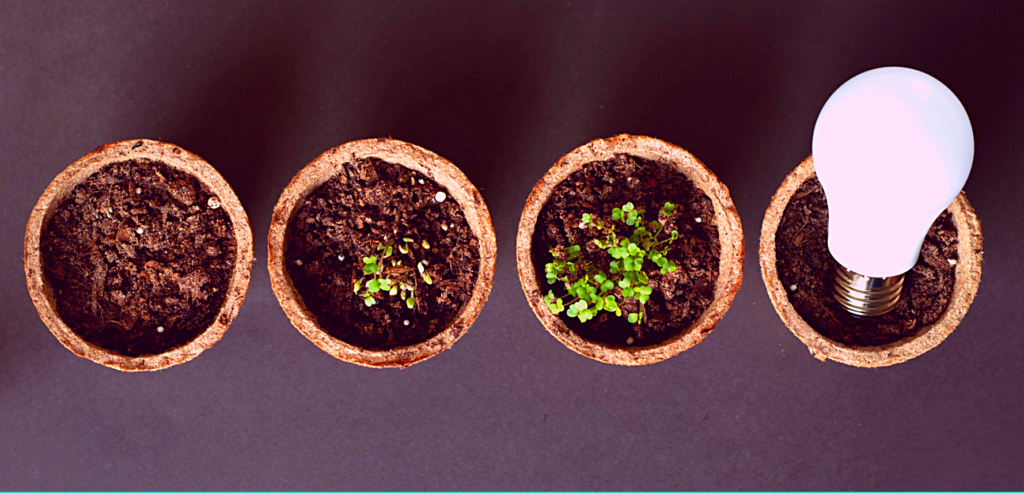
The garden is resilient. However, it is also delicate. New buds are easily squashed by a lack of confidence. If the conditions are harsh, nothing will take root for long.
Have Self-belief
One of the biggest problems comes from not believing in ourselves.
Imagine if Einstein sat at his desk thinking, “What’s the point, anyway? I wanted to be a physics professor and now all I do all day is look at other people’s patent applications. It’s boring and useless and my career is done for.”
Instead, he seized the opportunity that was right in front of him and unleashed the power of his creative mind.
By nourishing and protecting your thought garden, you are not just nourishing yourself. You are allowing yourself to make your best contribution to the world around you.
How to Become More Creative
Cultivating your thought garden isn’t something you can do overnight, but it is well worth the trouble, and it starts with quite simple things.
1. Look after your internal environment
One of the first things you can do to become more creative is to look after your internal environment.
Give yourself space, expose yourself to new ways of thinking, and the neuroscience shows that you will have more and better ideas.
It can be as simple as trying a new type of food or picking up a book by an author you’ve never read before.
2. Set up your work to be more conducive to creativity
Next, you can set up your work to be more conducive to creativity.
Make sure you’re well rested and take plenty of breaks. When you sleep soundly, your brain is nourished, cleansed and refreshed.
Prioritising rest isn’t selfish, it’s the opposite. Study after study shows that getting more rest improves your ability to be creative, solve problems, and get things done.
Fresh air really helps, and so do walks and meditation. Numerous studies show that walking, meditating, and time outdoors do wonders for our creative minds.
If you work indoors for long hours of the day, surrounding yourself with greenery and natural things can give you a real boost.
3. Counteract stress to help be more creative
To nourish your creative mind, you can also do whatever’s in your power to counteract stress.
We often make the mistake of thinking we work best under pressure, but stress actually shuts down the parts of the brain responsible for creative thought.
When you are constantly chasing after deadlines, rushing from one thing to the next, it becomes a challenge just to focus on what’s right in front of you, let alone coming up with your best new ideas.
4. Ask more questions
Another thing we can all do to become more creative is to be willing to ask more questions, of ourselves and others. Asking questions provokes us to give more thoughtful, helpful, insightful answers and ideas.
Find a way of working that works for you. Some of us do our best thinking when we’re alone in a quiet place, whilst others come up with our most brilliant ideas when during lively conversations. There’s no right or wrong way: it’s all about finding your process.
5. Grow your self-confidence
Last but not least is confidence. Perhaps you are already having lots of good ideas, but if you don’t believe in yourself, you’re never even giving them a chance.
Listen to yourself, and you will give your new ideas a chance to flourish.
Being More Creative is Worth the Effort
I know from experience how difficult it can be to change the way you work.
When you’re stressed, you reach for the first solution on hand. When you are busy, you don’t get enough sleep. And when you are overworked, you forget to take breaks and end up staring at a screen all day while your blood pressure skyrockets.
So, it’s not always easy. But it is well worth giving yourself and your team that little bit of space to come up with better ideas.
In my Idea Time book, I teach structured processes to help you become more creative. The goal is to tap into the fantastically innovative abilities that you might not even know you possess.
What’s the One Thing You Can Do Differently to Be More Creative?
When you finish reading this article, I want you to think about one thing you can do today to cultivate your thought garden.
Perhaps you could go to bed ten minutes earlier or set a timer to take breaks during the workday. You could pick up a new book you’ve been meaning to read, or you could just take a short walk outside.
At any time, you can start building the creative resources that will benefit you for the rest of your life.
Imagine if we could activate just 1% of all the great ideas that are wasted every day, and how enriched we would be as individuals as well. Our minds deserve to be nurtured.
Even if you are one of the lucky few who is naturally brilliant at tapping into their creative minds, I challenge you to try these techniques. We won’t all come up with Einstein’s theory of relativity, but we can all access more, better ideas when we help those connections grow.
Connecting things is what creativity is all about.
Do you believe in your ideas? What’s your biggest challenge when it comes to being more creative? Let me know what you think – I’d love to read your comments, so please do share your thoughts in the comments section below.
